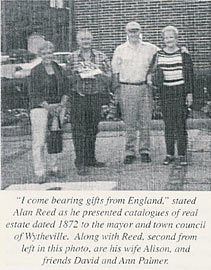 |
Wrington ARCHIVE Link with Wythville, Virginia, USA |
 |
 |
Wrington ARCHIVE Link with Wythville, Virginia, USA |
 |
| Reproduced here is a report of a visit by Alison Reed and her husband, Alan, both partners in the local firm of solicitors, Bennetts, to Wytheville, Virginia, USA. Being received in the year when Wrington commemorates the tercentenary of the death of John Locke, it provides a further reminder of the links between the West Country and North America. ~ ~ ~ ~ ~ Wythe County Historical Review An Account THE DAY ENGLISH VISITORS CAME TO WYTHEVILLE by Adelaide J. Smith On the morning of October 13, 2003, the sun was shining brightly when a light colored sedan drove into the parking lot of the municipal building in downtown Wytheville at 11 am. Waiting to greet four English visitors who stepped from the automobile were Trent Crewe, mayor of the town of Wytheville, Stephanie Porter-Nichols, editor of the Wytheville Enterprise, Frances Emerson, director of museums for the town of Wytheville, Frisby Smith, Vice-president of the Wythe County Historical Society, and Adelaide Smith, publications committee member for the Wythe County Historical Review. |
||||||
 |
||||||
| The story of why these English visitors arrived in our Southwest Virginia town had a beginning that goes back at least one hundred thirty years. The English visitors Alan R. Reed and his wife Alison G . Reed are attorneys in the law firm of Bennetts Solicitors & Attorneys located in Wrington near Bristol, England. Their friends and traveling companions David and Ann Palmer accompanied the Reeds to the United States on this pleasure trip to celebrate the 60th birthday of Alan Reed. The fact that Wytheville became an important part of this pleasure trip came about in the following way. |
||||||
| Reed's law firm, Bennetts, formed circa 1768, had a multitude of files and records. A number of years ago. soon after Reed began his career with the firm, he came across a real estate catalogue advertising land, dwellings, mines, and farms for sale in the southern and western parts of Virginia and in a few states bordering Virginia. In addition there was a supplemental catalogue. Edward Shelley and Co. of Wytheville produced the catalogues. and D.A. St. Clair of Wytheville printed them. The catalogues bore a date of 1872. These Virginia land advertisements had been sitting quietly in the dark on a shelf in the strong room at Bennetts for more than a century. Alan Reed felt strongly that something should be done about them. In a letter dated July 3, 2003, to Frances Emerson he had these words to describe his own thoughtful reasoning about these Virginia farms for sale. I immediately wondered why a Virginia real estate broker would be looking to sell farms in Virginia to potential emigrants from Bristol, England. An answer was given to me by Sheila Robinson, an American law student, who was working with me. ...She suggested that a considerable amount of property would have been for sale in Virginia then because many local people would have lost their lives or livelihoods as a result of the American Civil War that ended some 7 years previously in l865. ...She reminded me that Virginia had been an early English Colony which almost undoubtedly had close connection with Bristol because of Bristol's major tobacco manufacturing concerns which imported substantial amounts of tobacco from the southern states. ..[Thus] I had an explanation for the catalogue being in my office which I am bound to say I regard as an intriguing piece of English/American social history ... perhaps some families did indeed emigrate to Virginia from Bristol and maybe their descendants are still living and working the same farms or living in the locality. After pondering over the matter for a number of years, Alan Reed decided in the summer of 2003 to find out if the people in Wytheville might be interested in his discovery of these old real estate catalogues. In the first document there were 96 numbered descriptions of properties for sale. The sites in Virginia were located in Wythe, Pulaski, Grayson, Montgomery, Smyth, Washington, Buchanan, Carroll, Floyd, Franklin, Scott, Bland, Lee, Pittsylvania. and Roanoke counties. In the supplemental catalogue there were 180 entries, and the following directions appeared at the end of these entries. Gentlemen or Emigrants coming from England to settle on or near the lines of railway from Norfolk to Bristol, Virginia, can obtain Through Tickets to Wytheville at one cent a mile for themselves, their families and luggage over the same from Edward Shelley & Co., or from any of the following Agents in England, who will supply on application, by letter or otherwise, every information on the subject of purchasing Farms, and they will give exact and special directions for the journey to Virginia both by sea and land. Steerage passage and Through Tickets to Wytheville cost about 7 pounds per adult person: George Norcroft, General Agent, 2a Castle street, Liverpool. |
||||||